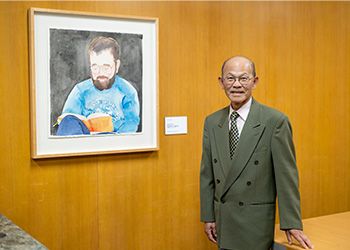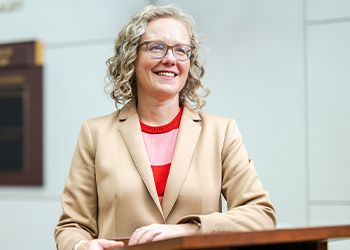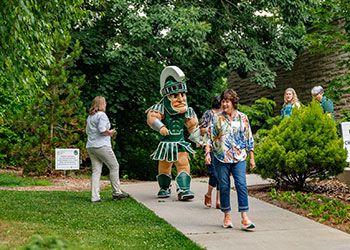More Than a Ticket to Ride
Donor support enables MSU to offer scholarships that address students' financial needs, while also providing an infrastructure for their personal and academic success.
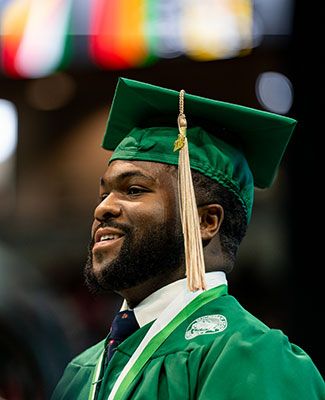
More Than a Ticket to Ride
Donor support enables MSU to offer scholarships that address students' financial needs, while also providing an infrastructure for their personal and academic success.
April 19, 2023Imagine that you’ve been given a free ticket to the world’s biggest, most exciting theme park.
At the gate, a crowd of well-wishers cheers you on, insisting that you’re going to have the absolute best time.
You can go on any ride you want to, visit any attraction that strikes your fancy, and take part in cool hands-on activities.
It is sure to be a once-in-a-lifetime experience, your well-wishers tell you: fun, enlightening, challenging-but-in-a-rewarding-way, full of self-discovery—and it will mold you into someone who is ready to take on the world!
“Go forth!” the well-wishers say. “And make the absolute most of this incredible opportunity you’ve earned with this coveted ticket!”
But you’ve never been to a theme park before. You’re on your own. The map you’re given is complicated and you’ve got questions. You’re overwhelmed with tips and tricks but aren’t sure who to ask for how to make the most of your time there. There are distractions everywhere. And sometimes you end up waiting in a long line for a ride that didn’t contribute as much to your experience as another one might have.
At some point, as you’re walking around, exhausted, overwhelmed, possibly even sweaty, you start to think: “Wow. It was nice of them to give me a ticket to come here … but it would be even nicer if the ticket came with some additional support, something to help me find my footing and some help to make this experience as meaningful as everyone says it’s supposed to be.”
This is what the college experience can feel like.
For so many students, the “ticket” (whether it’s admission alone, or admission paired with federal financial aid, student loans or scholarships) that helps them get to MSU is only half the equation.
The other half is what to do once they’re here. Do they have the tools they need to thrive in and out of the classroom? Do they graduate in a reasonable and financially efficient amount of time? And once they do, do they have the tools they need to thrive in their chosen field? Are they successful?
Much has been said about the broad concept of student success in the last several years. It is a pillar of the MSU 2030 strategic plan, a university-wide goal with six distinct objectives and a set of illustrative metrics. Those metrics include, among other things, increasing the graduation rate, making sure MSU’s environment promotes a sense of belonging and creating more diverse and innovative opportunities for high-impact learning experiences.
On a more granular level, each of MSU’s colleges and the departments within them are working to translate those goals and objectives in tangible ways, to promote student success within their respective majors and courses. For example, reimagining certain mathematics courses so that they are more equitable and don’t act as a barrier to students who may wish to pursue a degree in a STEM field but may be at a different level of math readiness than their peers.
And then, there are scholarship programs.
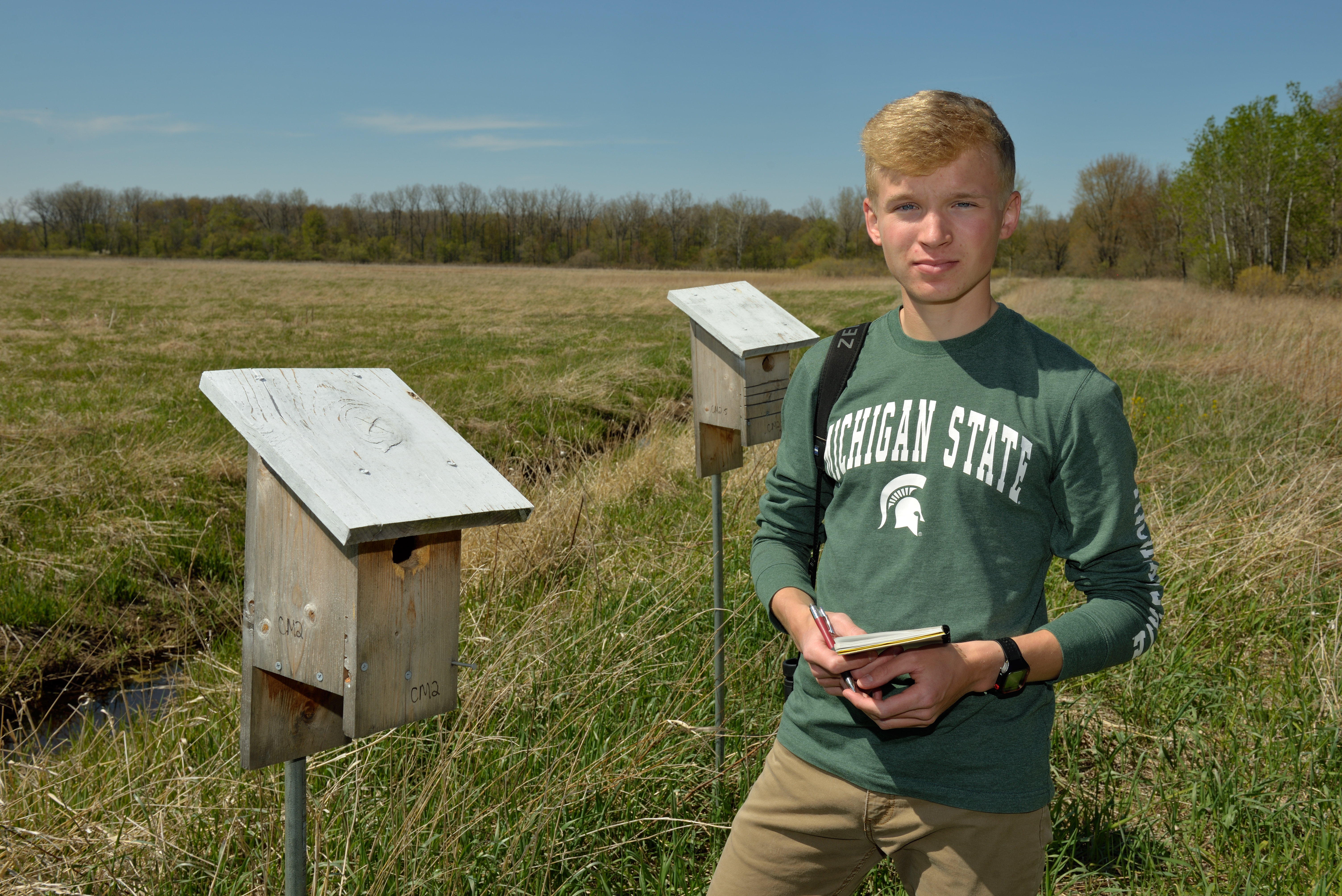
There has been a groundswell of support in recent decades for donor-funded scholarships that wrap financial aid and student success initiatives into tidy packages that help students graduate with less debt or pursue learning opportunities that they otherwise could not afford, while also offering one-on-one advising, opportunities for hands-on learning experiences and a sense of community and belonging among cohorts of students who share similar values, backgrounds or goals.
Several of these scholarship programs came to be during the Empower Extraordinary campaign, which netted $483 million in support of scholarships. Others, like the 25-year-old STARR Scholar program, have been making an impact since before many of today’s first-year students were even born. And others, still, have been created alongside more recent efforts by public universities to address systemic inequities and ensure that every student, regardless of where they come from, has the opportunity to thrive in an academic environment.
Philanthropy is critical to the existence, the success, the flexibility and the staying power of these scholarship programs and their ability to meet the financial, physical and educational needs of students as those needs arise and evolve.
So let’s take our theme park analogy one step further.
Let’s say, in the imagined theme park world we’ve created, that there’s an experience you want to have on the other side of the park, but the only way you know of to get there is to ride on a gondola that travels above the park. You will be gliding along in a little hanging car, nearly 100 feet off the ground, for approximately 30 minutes. For some park-goers, this is probably great fun. But for you … well … you are extremely afraid of heights.
By yourself, with a map that is hard to understand and no other immediate options in sight, it would be easy enough to say, “I’m afraid of heights! Forget it!” and miss out on the thing you wanted to do on the other side of the park.
But what if a park guide was standing nearby who noticed your distress and offered you some alternative solutions?
Like a friend with a similar fear of heights, who could tackle the challenge with you as you support each other through your fears.
Or some specific coping mechanisms to use once you’re in the air.
Or a helpful hint about which gondola car would be most comfortable for you—maybe the green ones offer a smoother ride than the white ones.
Or even an alternative route, that helps you avoid the gondola entirely and take a scenic footpath or a horse-drawn carriage or an electric scooter instead.
Think about all the reasons a person might not be able to make it across the proverbial park—then think about what systems can be put in place to make the journey more equitable for them.
The Detroit M.A.D.E. Scholars Program is one of those systems at MSU.
The result of a 2016 gift from the Gilbert Family Foundation, Detroit M.A.D.E. (Mastering Academics Demonstrating Excellence) is a program for students who come to MSU from Detroit or are graduates of a Detroit public or charter school. Many participants are also first-generation college students.
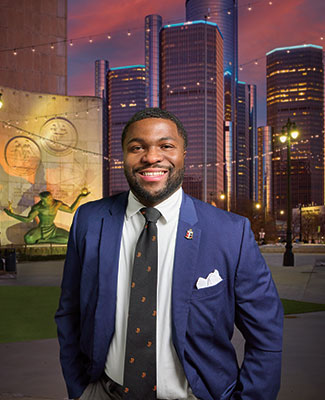
Darryl Ervin is all those things—a native Detroiter, born and raised; a graduate of Detroit’s Western International High School; and the first in his family to attend college. He was—and is—a lot of other things, too: a husband, a father, the co-founder of a Detroit-based nonprofit he started in high school with a friend.
He already had a lot on his plate when he came to MSU in the fall of 2018. But he found a sense of community and a support network in the Detroit M.A.D.E. program.
For starters, many of the students in the program lived in South Neighborhood, which, to Darryl, immediately felt like home.
“We all understood each other,” he says of the fellow first-year students he met living on the Detroit M.A.D.E. floor. “We know the streets that we grew up on, the high schools, the rivalries—we had a camaraderie. MSU is a huge place, and it can be easy to get lost, but in South Neighborhood it felt like I was right back on 31st Street where I grew up—like, ‘I’m really with my cousins now!’”
He also had access to a specialized advising team within the Detroit M.A.D.E. program, whose guidance helped him navigate the chaotic transition into college life—things like how to choose classes and build a schedule, or how to take notes properly or study efficiently for exams. They answered all of his questions, and never turned him or any members of his cohort away when they dropped by in need of advice.
But being part of Detroit M.A.D.E. would prove to be even more important and necessary than anybody could’ve predicted as Darryl entered his second year of school.
It is important to note that that year—the 2019/2020 school year—was defined for so many students not only by the Covid-19 pandemic, but by the nationwide wave of events that took place in response to the murder of George Floyd in the spring of 2020.
“There are a lot of organizations on campus that I identified with,” Darryl says. “I majored in accounting, so I had the National Association for Black Accountants. I had the Black Students Alliance. I was in fraternities. And they all supported me in different, important ways.
“But Detroit M.A.D.E. supported me for the fullness of who I am, and for all the identities I held as a Black man on campus.
“During that time, after the George Floyd incident, when everything was happening, it was the Detroit M.A.D.E. family that was checking on my mental health and trying to help all of us get the Black community on campus unified.”
Darryl continues, “It’s hard to explain the level of support that I had in the program. They were there from start to finish—not just in a ‘we’re here for you to help you figure out your class schedule’ way, but personally. On a personal level. That helped me keep pushing, that kept me in line.”
(He also owes a lot, he says, to faith. His faith in God. His faith in himself. And the faith others had in him—not the least of which came from the Detroit M.A.D.E. team. Not to get too deep into a totally different metaphor, but Darryl compares the Detroit M.A.D.E. program to bumpers—the ones you use to keep the ball out of the gutter in bowling. “They were my bumpers!” he jokes. “Without them, I probably would have been in the gutter!”)
Darryl graduated with a degree in accounting from the Eli Broad College of Business in December of 2022. He was the student speaker at the undergraduate commencement ceremony. And he is now working at his first post-college job, as a financial analyst at Deloitte’s Detroit office.
He also has plans—big ones—for the future. Perhaps an advanced degree—or two?—in a topic that interests him, like divinity or law. Trying his hand at policymaking, community building, ministry, and always—no matter where he is or what he does—mentoring the next generation of Detroit M.A.D.E. scholars and giving back to the program all that the program put into him.
Leaving with the feeling that you can take on the world
So how does a day at the theme park qualify as “successful?”
Much the same way as a day—or a yearslong degree program—at Michigan State does.
You got in.
Maybe your ticket was even free, or maybe someone offered to cover some of it, to make it easier for you.
You navigated all the experiences you wanted to have, and you liked the ones you chose.
You conquered challenges with support from people who cared enough to help you.
And the rush of adrenaline and pride in yourself that you experienced along the way was enough to make you think that maybe the next challenge life throws at you is conquerable, too.
LEARN MORE about support for students by contacting the Advancement Office in your college or unit, or Senior Director of Development for the Office of Philanthropy for Undergraduate Education Jennifer Bertram at bertram9@msu.edu or by calling (517) 432-7330.
READ MORE about some of MSU’s scholar programs.


